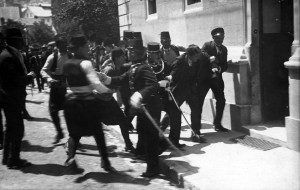Preparations for conflict spread across Europe
Special to The Great War Project

The assassin Gavrilo Princip, captured in Sarajevo, after shooting the Archduke Franz Ferdinand and his wife. The spark that led to war.
(24 July) It is a Friday morning, and by 10 a.m. all the big powers in Europe are notified of Austria-Hungary’s ultimatum to Serbia.
But why is this a matter that should worry Europe’s powers? After all, it is an ultimatum delivered by the weakest of Europe’s “great” powers to a small unruly state on the periphery of Europe. It is widely assumed that Serbia cannot accept, but in recent years there have been small wars involving the big powers, and they remained contained and localized. Won’t that be the case if war should break out between Vienna and Belgrade?
Perhaps. But the prevailing system of alliances in Europe works against the containment of the conflict. Germany denies it publicly, but it wants a war between Austria-Hungary and Serbia. It has no interest in seeing that war remain local.
The logic in Berlin, especially among Germany’s top military leaders, is that war between Germany and Russia is inevitable, and they fear Russia will be the winner. So better sooner than later, the German generals reason. If Austria-Hungary attacks Serbia, they believe Russia will intervene to save Serbia, its smaller Slavic cousin.
If Russia comes into the conflict that would serve as a casus belli for Germany to enter the conflict in order to defend its ally, Austria-Hungary. But the real goal would be to destroy Russia.
The problem with that logic is that France and Great Britain, the world’s greatest power, are formal allies of Russia. So Germany develops a plan to hit France with a lightning strike and knock it out of the war quickly, thus allowing Germany to fight Russia in Europe’s east without a second war with France on Europe’s west.
Thus a single pistol shot in June in faraway Sarajevo threatens the peace of the world on Friday, 24 July, 1914, exactly one hundred years ago to this day.
The Russian Foreign Minister Serge Sazonov does not hide how he sees it. “Serbia may count on Russian aid,” he declares on this day. “This means a European war.” Meeting with the Austrian ambassador in St. Petersburg, Sazonov says: “You are setting fire to Europe…The fact is you mean war and you have burnt your bridges….One sees how peace-loving you are.”
